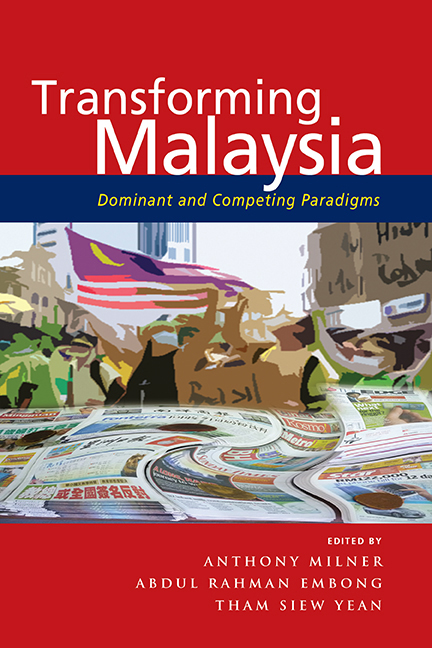Book contents
- Frontmatter
- Contents
- List of Tables and Figures
- Preface
- Acknowledgements
- List of Contributors
- 1 Introduction
- 2 Race and Its Competing Paradigms: A Historical Review
- 3 Knowledge Construction, the Rakyat Paradigm and Malaysia's Social Cohesion
- 4 Race Paradigm and Nation-Building in Malaysia
- 5 Race-Based Paradigm in Poverty Eradication and Income Distribution Analysis and Policy
- 6 Foreign Workers in Malaysia in the Post-Independence Era: Race Paradigm in State Policy, Academic Writings and Public Discourse
- 7 Trade Policy Formulation in Malaysia: Navigating between the Economic and Race Paradigms
- 8 National Security Conceptions and Foreign Policy Behaviour: Transcending the Dominant Race Paradigm?
- Index
6 - Foreign Workers in Malaysia in the Post-Independence Era: Race Paradigm in State Policy, Academic Writings and Public Discourse
Published online by Cambridge University Press: 21 October 2015
- Frontmatter
- Contents
- List of Tables and Figures
- Preface
- Acknowledgements
- List of Contributors
- 1 Introduction
- 2 Race and Its Competing Paradigms: A Historical Review
- 3 Knowledge Construction, the Rakyat Paradigm and Malaysia's Social Cohesion
- 4 Race Paradigm and Nation-Building in Malaysia
- 5 Race-Based Paradigm in Poverty Eradication and Income Distribution Analysis and Policy
- 6 Foreign Workers in Malaysia in the Post-Independence Era: Race Paradigm in State Policy, Academic Writings and Public Discourse
- 7 Trade Policy Formulation in Malaysia: Navigating between the Economic and Race Paradigms
- 8 National Security Conceptions and Foreign Policy Behaviour: Transcending the Dominant Race Paradigm?
- Index
Summary
INTRODUCTION
Large scale labour migration into the constituent regions of Malaysia i.e., Malaya, Sabah and Sarawak began in late nineteenth century when these regions were under British rule. For Malaya, the first of the three regions to attain independence the large inflow was induced by the introduction of capitalistic economic enterprises at a time when the region was sparsely populated. Millions of workers were brought in from India, China and Indonesia to work in the expanding production of tin and agricultural products for exports and the accompanying infrastructural development (see among others, Kaur 2006 and Khoo 2008, pp. 11–31). Many of the early labour migrants stayed on such that on independence in 1957, there were millions of foreigners comprising mainly those from China, India and Indonesia in Malaya. On independence, the immigrants were accorded citizenship by naturalization made possible by Article 16 of the Federal Constitution. The newly independent Federation of Malaya adopted a democratic government, based on a power sharing formula between the three major ethnically based political parties — the United Malay National Organization (UMNO), Malayan Chinese Association (MCA) and the Malayan Indian Congress (MIC) who formed the Alliance party. The Alliance party which gained power in 1957 election was later enlarged to form the Barisan Nasional (BN or National Front) with the incorporation of more political parties in the early 1970s. With the establishment of Malaysia in 1963 which saw the incorporation of Singapore, Sabah and Sarawak into the federation, this political power sharing formula was continued with more ethnically based or ethnically dominated political parties joining the BN. Since then the BN which now comprises thirteen political parties from the Peninsula, Sabah and Sarawak remains the party in power. Given this demographic and political background, managing race/ethnic relations is highly problematic and ethnic conflicts and violence occur once in a while, the worst being the May 13 incident in 1967. The balance of power between the ethnic political parties is keenly guarded by the respective ethnic party leaders. This race paradigm is not confined to the political arena only; it also pervades into almost every aspect of Malaysian life.
- Type
- Chapter
- Information
- Transforming MalaysiaDominant and Competing Paradigms, pp. 143 - 177Publisher: ISEAS–Yusof Ishak InstitutePrint publication year: 2014

